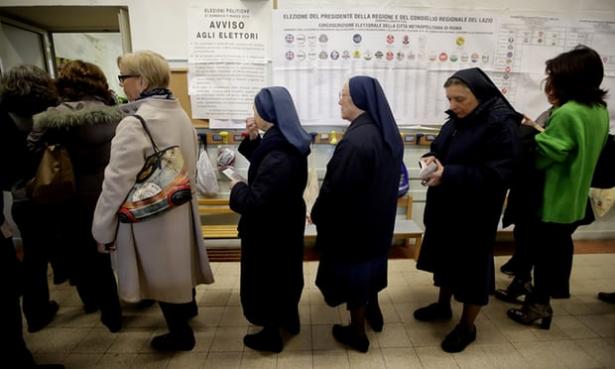Too little and far too late. Six words that sum up the performance of the Italian economy in the decade since the financial crisis, and that go a long way towards explaining the support for populist parties in the election.
Indeed, if ever there was a country that was ripe for a protest against the political mainstream it was Italy, where four years of modest growth have not been nearly enough to repair the damage caused by a deep slump in 2008-09 and a second two-year recession in 2012-13.
Only two countries that belong to the west’s club of rich nations, the Organisation for Economic Co-operation and Development, have yet to see economic activity surpass pre-financial-crisis levels. Greece is one. Italy is the other.
In some respects, Italy’s record since the turn of the century is even worse than that of Greece, because at least Greece had a boom before the bad times arrived. Italy’s living standards are only slightly higher than they were when the country became a founder member of the single currency in 1999.
Membership of the euro has clearly been a factor in explaining the rise of populism in Italy, because it has made it impossible for governments in Rome to restore competitiveness by devaluing the currency – something they did on a regular basis in the days before monetary union. The disciplines of euro membership have resulted in slower growth, stagnant wages, high unemployment and austerity – perfect conditions for Beppe Grillo’s Five Star Movement to exploit.
Mainstream politicians such as Italy’s outgoing prime minister, Paolo Gentiloni, can point to some small successes. A million jobs have been created in the past four years, although 60% of them are part-time. Youth unemployment has come down, but a third of all people under the age of 25 are still without work – double the average for the EU. Unable to find jobs at home, young Italian graduates have left the country to find opportunities elsewhere.
Speaking in Davos less than two months ago, Gentiloni aptly summed up the problem he faced at the election. “There are still unacceptably large parts of our populations who feel unsatisfied with their conditions and worried about the future.
There are certain features that appear to make populist insurgencies more likely. A country needs to have been through a prolonged economic trauma, just as Italy has. It needs to be geographically split between a fast-growing region and a struggling region, as Italy is with the marked divide between the industrial north and the agrarian south. It needs policymakers to respond to the budget deficits that result from high unemployment and slow growth by imposing welfare cuts, which Italian governments have been obliged to do as a result of the EU’s fiscal rules. And it needs economic and social tensions to be inflamed by mass immigration, as has been the case in Italy, the main gateway to Europe for those travelling from Libya.
Like Britain, Italy has a productivity problem, only worse. Like France, it has an unemployment problem, only worse. Like Spain, it has had banking problems, only worse. And as in Germany, a sudden surge in migration has created a twin problem for the mainstream parties. It has made them appear to be completely out of touch with ordinary voters, and to be like rabbits in the headlights.


Spread the word